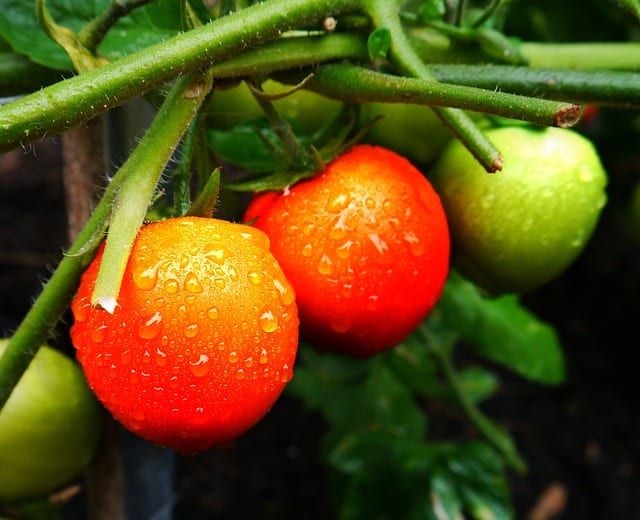
I got to meet a friend for the first time this weekend. We’d corresponded online but never met in person. This week she was coming through town and asked to visit me, and I was glad to say yes. She asked if she could bring groceries for me, and some for the Friendship Room. I was glad to say yes to that as well.
I was raised in the city. To me, groceries are a thing that comes in cans and plastic bags from Wal Mart or Aldi.
But my friend didn’t bring food from Wal Mart. She brought food from her local farmers’ market.
I hadn’t been able to get to our farmers’ market even once this year. Money has been tight, too tight to justify paying a little more for fresher food, and there’s always something more important to do than to take the bus to the edge of town on Wednesday evenings. And my own garden was tiny this year– between our conflicts with the neighbor and my fatigue, I’d barely planted anything.
There was a crate of fresh peaches, perfectly ripe, of which I claimed half and left half for the Friendship Room. There was an abundance of eggs of multiple sizes and shades of brown– varied and imperfect enough to make you remember that eggs come out of a living thing and not a factory. I knew before cracking any that their yolks would be orange, and taste totally different from the ones I got from the store.
The eggs were warm.
“I keep my eggs on the counter for a week,” she said. “They never go bad.”
We put some on the counter, and the rest in the fridge when we ran out of space. Six dozen, we kept in the car for the Friendship Room.
There were bags in the trunk with brown and black rice for us, and a bag of canned soups and healthy snacks for the Friendship Room’s Little Free Grocery cupboard. There were also three large bars of organic dark chocolate for us, but they had a “may contain wheat” warning, so we put them back in the bag of food for downtown.
There was a cooler filled with grass-fed meat, dairy products and “fresh milk–” and when she said fresh, she meant it. The milk had a layer of cream on top. The butter was really yellow like butter in a storybook. The cream was impossibly thick and had already begun to form butter on its own. There was even a mason jar of clabber, the piercingly sour yogurt that forms when you leave brand new milk on the counter.
“When God said that He would lead the Israelites to the perfect place, what did He say it would be flowing with?”
“Milk and honey,” I said, reverently.
Clabber is so sour I can’t eat it without honey. That must be what God was talking about.
After I claimed my share of the treasure from the trunk, my friend opened the side door of her van. The seats were piled with fresh produce. There was a whole crate of perfectly ripe peaches– half for us, half for the Friendship Room. There were organic bananas– two bunches for us and a whole box for the Friendship Room. There were two kinds of melon that rang when you knocked on them– two for me, two for the Friendship Room. There were ears of sweet corn with the husks fresh and green– half for me, half for the Friendship Room.
There was a cardboard box of softball-sized tomatoes– you find year round at the grocery store. These were the heirloom kind that eccentric farmers grow, hoarding the seeds for generations; the kind that actually tastes of tomato without any coaxing. When I leaned in to admire the glistening skins, I could smell the acid of the vines they grew on and the rich earthiness of the soil. Half of the tomatoes were scarlet, and half were deep yellow.
“Are the yellow ones ripe?” I asked.
They were ripe. This was an heirloom breed that stays yellow.
“The Italian word for ‘tomato’ is ‘pomodoro,'” said my friend, enunciating carefully. “What does ‘pomo-doro’ literally mean?”
“Golden apple!” I said.
I put the box of red and yellow tomatoes on a hidden part of my porch away from thieving neighbors, and then I counted out half of them to take to the Friendship Room. I didn’t have an extra box, but I was wearing my usual uniform of a long skirt with shorts underneath. I carried the tomatoes folded up in my skirt like Saint Juan Diego with his miraculous December roses.
They say that when Saint Juan Diego brought those roses to the bishop, he believed the roses themselves were the miracle. The bishop, however, didn’t notice the roses; he was looking at the miraculous icon that appeared on the cloth they were carried in.
The bishop was silly, of course. The roses were as much a miracle as the icon. Everything that lives and grows and is beautiful, is a miracle.
I got in the car to show my friend the way to the Friendship Room. Michael almost stayed home, saying he needed to mow the lawn. My friend told me to convince him to come along so as not to mow the clover– our yard this time of year is all purple clover and Queen Anne’s lace, a buffet for the butterflies and bees. We mow often enough to not get into trouble with the city, but I do like to leave blossoms for the pollinators as long as I can. I gave them a few more hours to browse, by taking Michael and Rosie downtown with me to drop off food. Clover and bees are also miracles.
“I brought you a farmer,” I said as I slid out of the car, my skirt still wrapped around those precious tomatoes.
“I don’t deserve the credit!” said my friend.
Downtown Steubenville is a dismal place, all tan and ecru brick gone gray with the pollution over time under a perpetually overcast sky. The people can seem gray as well, faded and washed out with despair. Everything is drained of color. When I gently dropped my burden on the nearest white plastic picnic bench in the Friendship Room’s backyard, it looked like the tomatoes been cut out of a magazine ad and pasted on a gray-scale photograph.
They really did look like golden apples.
Rosie came up behind me, her arms loaded with sweet corn. Next came Michael with peaches and bananas, and then my friend with a cantaloupe. “This is very ripe,” she cautioned, “and will have to be eaten today.”
“You don’t have to warn us,” said one of the volunteers.
Downtown Steubenville is a food desert; there’s no real grocery store without a twenty minute bus ride. People spend their food stamps at Dollar Tree and Speedway. There’s nowhere to get fresh ripe produce. It’s all the Friendship Room can do to keep their fruit bowl full and have enough salad for every guest. We might as well have been bringing them a chest of jewels.
We handed off chocolate bars, which one of the volunteers jokingly tried to pocket before putting them in the fridge. We carefully handed off the brown eggs.
“These are real eggs,” I said. “The brown kind! All different sizes!”
“Oh,” said a volunteer, flapping his arms, “Not like those fake eggs from mechanical chickens?”
Rosie got the honor of filling the Little Free Pantry’s shelves with the cans of fancy organic soup, and pouches of paleo coconut snacks.
Then we went home. I cut open that watermelon. It barely needed a knife; it was perfectly ripe. When the top was cracked open, the whole thing split into two glittering halves like a geode, nearly magenta and sweet as candy. If the juice had turned to healing myrrh, if rubies and diamonds had spilled out, if a holy icon had appeared inside, I don’t think it could have been more miraculous.
Everything that lives is a miracle.
(image via Pixabay)













